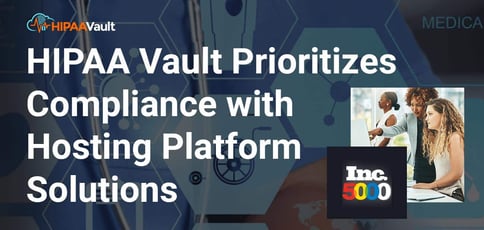
TL; DR: HIPAA, or the Health Insurance Portability and Accountability Act, is a 1996 US Congress Act that guarantees the protection and privacy of sensitive patient health information from unauthorized disclosure without the patient’s consent or knowledge. But for healthcare platforms — hospitals, therapy apps, smart tech — any old hosting service isn’t enough to guarantee this type of security. That’s where HIPAA Vault comes in. Gil Vidalas, CTO of HIPAA Vault, told us how HIPAA Vault uses cutting-edge technologies to stay ahead of the curve for its clients.
You’ve heard of the saying “know your audience,” so you probably know it’s not just a throwaway line — it’s the foundation of your business.
Think about it: Nike caters to sports enthusiasts, not just people who need shoes; Apple targets middle to upper-class consumers, not those unable to splurge on a $1,000 iPhone; Tide appeals to women, rather than teenage boys who, let’s be honest, couldn’t care less about laundry.
Plus, being too broad is dangerous: Without identifying your audience or understanding their pain points, you risk creating products or services that fail to resonate with anyone. But pinpointing your target audience and addressing their specific needs means you can tailor your solutions and build a loyal customer base.
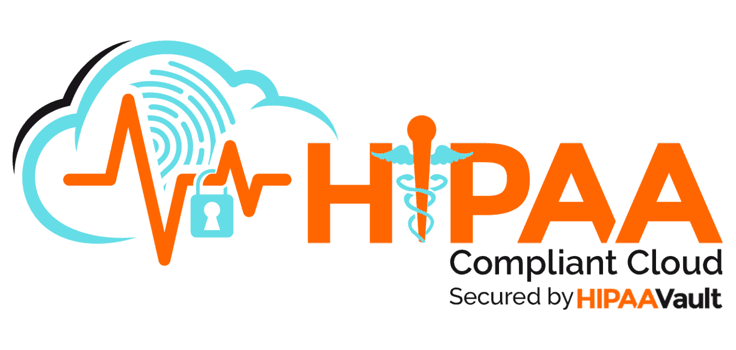
And that’s precisely what HIPAA Vault did. HIPAA Vault is a HIPAA-compliant web hosting and cloud solution provider — specifically for healthcare organizations and platforms — that keeps compliance and security at the forefront.
The story behind HIPAA Vault has a true superhero origin element, though.
“When we took on one of our client’s systems as our first HIPAA client, the monthly cost was much higher than what we would have done if it hadn’t been HIPAA,” explained Gil Vidalas, CTO of HIPAA Vault. “Since then, we’ve pivoted to HIPAA-compliant hosting, and our vision is to protect their patients’ medical data.”
Pioneering HIPAA-Compliant Hosting
Not only is protecting patient medical data the law, but studies show that protected health information (PHI) — or ethical health research and privacy protections — are essential for preserving individual rights and societal well-being.
HIPAA Vault takes care of every aspect of hosting your organization’s platform while guaranteeing patient medical protection and privacy, including 24/7 monitoring and mitigation of vulnerabilities, with the scalability of the cloud and a 99.99% uptime guarantee.
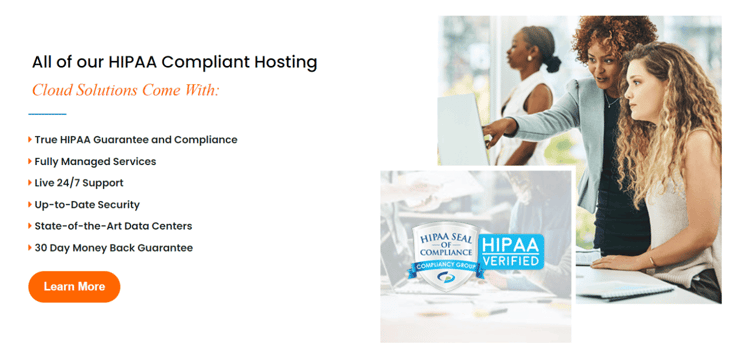
And yet, it wasn’t always what it is today.
Technically, HIPAA Vault traces its roots back to 1997. It was a different company then, mainly dealing with search engine optimization (SEO) and virtual machine (VM) web hosting.
“At the time, there was competition to see who could offer the lowest price for these services. But it became obvious to me that if we kept lowering the price, it’s just a race to the bottom,” Gil recalled.
Thankfully, Gil said, it was around then when things took a turn: A customer had come knocking, asking about hosting services that could protect medical data and comply with HIPAA regulations. Gil and his team didn’t know much about HIPAA compliance, but with some elbow grease, the company had pivoted to HIPAA-compliant hosting by 2010.
“Our vision and goal is to protect their patient medical data, and we do that for all sorts of companies,” Gil said.
Some of HIPAA Vault’s clients include hospitals, medical platforms, and healthcare apps from practitioners, developers, enterprises, and government agencies.
To ensure compliance, HIPAA Vault employs compliance managers, also known as Certified Information Systems Security Professionals (CISSPs), who possess expertise in security protocols, operating procedures, and pertinent policies within PHI.
“Thankfully, HIPAA isn’t a moving target, but when it comes to compliance, it’s good to have expertise on board — and that’s exactly what we offer,” said Gil.
Choose from hosting services, or opt for Workspace, Office, or Enterprise solutions, and only pay for what you need. If you’re unsure where you stand, HIPAA Vault also lets you check your compliance for free.
Securing Digital Infrastructure in Healthcare
Google is the second-most trusted brand in the technology sector, with a net trust score of 51.86, according to a 2023 survey.
And with something as sensitive as medical data, it probably comes as no surprise that the Google Cloud Platform is HIPAA Vault’s choice for security and AI capabilities.
“We use a lot of Google’s services because we strongly believe Google is an innovator, and it’s good to stay with the leader,” noted Gil.
Another part of this decision is driven by the critical importance of secure digital infrastructure, especially as healthcare organizations transition to digital platforms to handle sensitive data. Cloud hosting provides plenty of benefits, from scalability to advanced security.
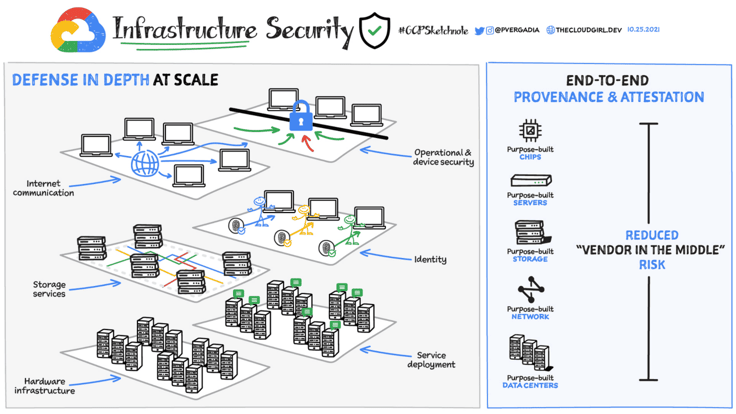
Gil also said you can’t ever be too safe: “There’s always new ways for attackers to come in, so we have to be on our toes and continually look for how they’re trying to get in and ensure we have the measures to keep countering it.”
The apparent security risk in the healthcare industry is because of the advancements in technology. I’ve said it before and I’ll say it again: As tech gets more intelligent, so do cyber attackers.
Google Cloud is a grade-A choice because it has a zero-trust model, which Gil explains differs from the old-school model of building defenses to protect against attackers.
Instead, it goes on the offense.
“The zero-trust model is different because it assumes the bad guy is in the castle already, and you’re trying to limit the damage,” Gil explained.
HIPAA Vault also uses Google Cloud’s AI product.
AI has already been proven to increase productivity and reduce typical human factor errors, which is crucial in healthcare settings. HIPAA Vault’s clients can build a Google-powered search index based on their own data or document AI to gain insights and extract, classify, and split data from patient documents or reports.
Adapting to – and Envisioning – the Future
Computer speed and power have been doubling every one and a half to two years since the 1960s and ‘70s. This tech advancement has evolved into today’s trends: More than 90% of surveyed Fortune 1000 companies are currently investing in big data and AI.
HIPAA Vault stays agile and competitive by letting its clients move into their own projects so they can adapt to the services and enhancements they need. This way, Gil pointed out, pricing is completely customized and based on what is actually used.
Gil also foresees a shift toward proactive healthcare models that enable people to maintain health rather than just treat illness — a shift facilitated by technology.
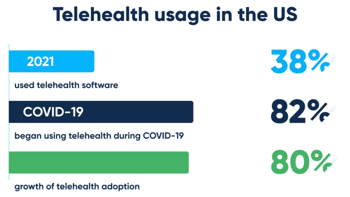
He’s referring to things like wearable technology — like Apple Watches that can measure your heartbeat or how long you’ve run — whose market is predicted to grow to nearly $70 billion by 2026. One of the most saturated applications of this technology is healthcare.
Gil put it this way. Think about the medical model a few years ago when you went to the doctor if you were sick. Now, it’s different: You don’t have to have a medical issue to talk to a healthcare professional. Instead, you can go in and tell them your health goals or even request a gene profile of your genomics.
“Unfortunately, waiting until someone gets sick results in higher costs for medication and procedures, like CAT scans or X-rays. But there’s a shift toward proactive healthcare, where people are seeking treatment while still healthy to reduce those long-term expenses,” Gil said.
And the future looks pretty bright, too.
“This revolutionary paradigm shift with healthcare and technology is pretty exciting, and I’m sure we’re gonna see more of that in the future,” Gil noted.



